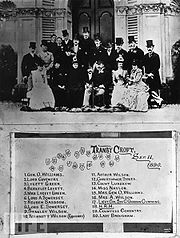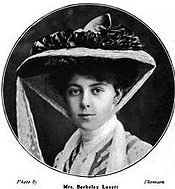
Berkeley John Talbot Levett
Encyclopedia

Royal Victorian Order
The Royal Victorian Order is a dynastic order of knighthood and a house order of chivalry recognising distinguished personal service to the order's Sovereign, the reigning monarch of the Commonwealth realms, any members of her family, or any of her viceroys...
(11 November 1863 – 1 November 1941), was a Major
Major
Major is a rank of commissioned officer, with corresponding ranks existing in almost every military in the world.When used unhyphenated, in conjunction with no other indicator of rank, the term refers to the rank just senior to that of an Army captain and just below the rank of lieutenant colonel. ...
in the Scots Guards
Scots Guards
The Scots Guards is a regiment of the Guards Division of the British Army, whose origins lie in the personal bodyguard of King Charles I of England and Scotland...
and later a Gentleman Usher
Gentleman Usher
Gentleman Usher is a title for some officers of the Royal Household of the United Kingdom. See List of Gentlemen Ushers for a list of office-holders.-Historical:...
for the Royal family. He was a witness in the Royal Baccarat Scandal
Royal Baccarat Scandal
The Royal Baccarat Scandal, also known as the Tranby Croft scandal, was an English gambling scandal of the late nineteenth century involving the future King Edward VII.-Background:...
of 1890 in which the future King Edward VII was drawn into a gambling dispute which painted him in an unflattering light.
Life and career
The son of Col. Theophilus John LevettTheophilus John Levett
Colonel Theophilus John Levett was a Conservative Party politician in the United Kingdom, who served as Member of Parliament for Lichfield from 1880 to 1885....
of Wychnor Park
Wychnor Hall
Wychnor Hall is an early 18th century country house near Burton on Trent, Staffordshire. Formerly owned by the Levett family, descendants of Theophilus Levett, Steward of the city of Lichfield in the early eighteenth century, the hall has been converted to a Country Club. It is a Grade II listed...
, Member of Parliament
Member of Parliament
A Member of Parliament is a representative of the voters to a :parliament. In many countries with bicameral parliaments, the term applies specifically to members of the lower house, as upper houses often have a different title, such as senate, and thus also have different titles for its members,...
for Lichfield
Lichfield
Lichfield is a cathedral city, civil parish and district in Staffordshire, England. One of eight civil parishes with city status in England, Lichfield is situated roughly north of Birmingham...
,, and member of an ancient family
Levett
Levett is an Anglo-Norman territorial surname deriving from the village of Livet-en-Ouche, now Jonquerets-de-Livet, in Eure, Normandy. Ancestors of the earliest Levett family in England, the de Livets were lords of the village of Livet, and undertenants of the de Ferrers, among the most powerful of...
, Levett enjoyed playing cards and saw himself as a dashing figure in society circles. On 8 September 1890, the Scots Guards officer was in the company of royalty and fellow socialites at Tranby Croft
Tranby Croft
Tranby Croft is a large country house and estate at Anlaby, near Hull in the East Riding of Yorkshire, England. The mansion is now a co-educational, independent day school, Hull Collegiate School.Tranby Croft is a Grade II listed building....
in Yorkshire
Yorkshire
Yorkshire is a historic county of northern England and the largest in the United Kingdom. Because of its great size in comparison to other English counties, functions have been increasingly undertaken over time by its subdivisions, which have also been subject to periodic reform...
when the incident which set off the Royal Baccarat Scandal occurred. At the time, Levett was a soldier and bon vivant said to be the best-dressed man in London. One society publication referred to him as the "noted soldier and dandy." The subsequent events led to a slander trial at which Levett was one of the defendants. Although the defendants won the case, public mood was against them.

The New York Times
The New York Times is an American daily newspaper founded and continuously published in New York City since 1851. The New York Times has won 106 Pulitzer Prizes, the most of any news organization...
noted, "the Pall Mall Gazette
Pall Mall Gazette
The Pall Mall Gazette was an evening newspaper founded in London on 7 February 1865 by George Murray Smith; its first editor was Frederick Greenwood...
this afternoon, in referring to the garden party
Garden party
A garden party is a social gathering with food provided, in the open in a park or a garden. An event described as a garden party is usually more formal than other similar gatherings, which may be called just parties, picnics, barbecues, etc,...
(for the Emperor), gives great prominence to the fact that Mr. and Mrs. Arthur Wilson, Mr. and Mrs. E. Lycett Greene, and Lieut. Berkeley Levett, all of whom were prominent in the Tranby Croft baccarat scandal, were among the guests at the garden party."
Berkeley Levett served as Aide-de-camp
Aide-de-camp
An aide-de-camp is a personal assistant, secretary, or adjutant to a person of high rank, usually a senior military officer or a head of state...
in India to William Mansfield, 1st Viscount Sandhurst
William Mansfield, 1st Viscount Sandhurst
William Mansfield, 1st Viscount Sandhurst GCSI, GCIE, GCVO, PC was a British Liberal politician and colonial governor...
who was Governor of Bombay from 1895 to 1900. In 1900, back in England, Levett married Sibell Lucia Bass of the Bass brewery family, daughter of Hamar Alfred Bass
Hamar Alfred Bass
Hamar Alfred Bass was a British brewer, race horse breeder and a Liberal Party politician who sat in the House of Commons from 1878 to 1898....
, Member of Parliament
Member of Parliament
A Member of Parliament is a representative of the voters to a :parliament. In many countries with bicameral parliaments, the term applies specifically to members of the lower house, as upper houses often have a different title, such as senate, and thus also have different titles for its members,...
, on 2 June of that year. Having sold his share of the family's Staffordshire
Staffordshire
Staffordshire is a landlocked county in the West Midlands region of England. For Eurostat purposes, the county is a NUTS 3 region and is one of four counties or unitary districts that comprise the "Shropshire and Staffordshire" NUTS 2 region. Part of the National Forest lies within its borders...
estates, he and his wife lived in Lancaster Gate
Lancaster Gate
Lancaster Gate is a mid-19th century development in the Bayswater district of west central London, immediately to the north of Kensington Gardens. It consists of two long terraces of houses overlooking the park, with a wide gap between them opening onto a square containing a church. Further...
, London; Cottington, Sidmouth
Sidmouth
Sidmouth is a small town on the English Channel coast in Devon, South West England. The town lies at the mouth of the River Sid in the East Devon district, south east of Exeter. It has a population of about 15,000, of whom 40% are over 65....
, Devon
Devon
Devon is a large county in southwestern England. The county is sometimes referred to as Devonshire, although the term is rarely used inside the county itself as the county has never been officially "shired", it often indicates a traditional or historical context.The county shares borders with...
; and Saint-Jean-Cap-Ferrat
Saint-Jean-Cap-Ferrat
Saint-Jean-Cap-Ferrat , Italian: San Giovanni Capo Ferrato, is a commune of the Alpes-Maritimes department in southeastern France.It is located on a peninsula next to Beaulieu-sur-Mer and to Villefranche-sur-Mer and extends out to Cap Ferrat...
, France, often turning up at society events before World War I
World War I
World War I , which was predominantly called the World War or the Great War from its occurrence until 1939, and the First World War or World War I thereafter, was a major war centred in Europe that began on 28 July 1914 and lasted until 11 November 1918...
.
Berkeley Levett kept up his royal connections while serving as one of the Gentlemen Ushers for the Royal Household
Royal Household
A Royal Household in ancient and medieval monarchies formed the basis for the general government of the country as well as providing for the needs of the sovereign and his relations....
from 1 April 1919 to 1 December 1931. Later Levett was promoted to the rank of Major
Major
Major is a rank of commissioned officer, with corresponding ranks existing in almost every military in the world.When used unhyphenated, in conjunction with no other indicator of rank, the term refers to the rank just senior to that of an Army captain and just below the rank of lieutenant colonel. ...
. He and his wife had two sons, one of whom was killed in World War I.
Baccarat scandal
Levett was drawn into the scandal after a night in which Sir William Gordon-Cumming, 4th BaronetSir William Gordon-Cumming, 4th Baronet
Sir William Alexander Gordon Gordon-Cumming, 4th Baronet was a Scottish landowner, soldier and adventurer. A notorious womaniser, he is best known for being the central figure in the Royal Baccarat Scandal...
, a fellow officer from the Scots Guards, was accused of cheating at Baccarat
Baccarat
Baccarat is a card game, played at casinos and by gamblers. It is believed to have been introduced into France from Italy during the reign of King Charles VIII , and it is similar to Faro and Basset...
, a card game. Levett testified later that he had witnessed the cheating. Although Gordon-Cumming maintained that he had not cheated and the others had been mistaken, he had when confronted signed a statement pledging never to play cards again in return for an agreement that no-one present would speak again of what had happened. The assembled players feared the worst if the scandal leaked. For four months afterwards, Sir William split his time between his Scottish estates, his Scots Guards regiment, his wealthy American fiancee and his Paris club, hoping that the others would hold to their pledge.
The secret pact did not hold. An anonymous letter from Paris informed Sir William that gossips on the Continent were chattering about the events of that evening — and about Gordon-Cumming's alleged cheating. Enraged, Sir William brought suit against those present, including Berkeley Levett, charging slander. When the suit came to court in June 1891, it was a stylish affair: only those observers sporting a note from the Lord Chief Justice were admitted. The cream of society turned out dressed as though for Royal Ascot.
Levett testified under oath, and although the jury ultimately ruled for him and the rest of the defendants, the damage was done. Sir William was drummed out of his regiment and forced to resign from his clubs. The future King, who was required to testify and thus reveal his penchant for card-playing, was outraged. "Thank God", said the future King, "the army and society are now well rid of such a damned blackguard."
The royal reputation had been called into question. Newspapers and public opinion sided squarely with Sir William. Word in the street largely blamed the future King. In circles like Berkeley Levett's, consensus was the King was to blame, but for a different reason: the contentious card game had transpired at the estate of a newly-rich shipping millionaire.
The jury took 10 minutes to find all the defendants not guilty and award them their legal costs. It was not a popular decision. The crowd hissed and booed the jurors, and tried to attack the defendants as they left the courtroom.
External links
Further reading
- "The Royal Baccarat Scandal", Edward Grayson, Michael Havers, Kimber, 1977

